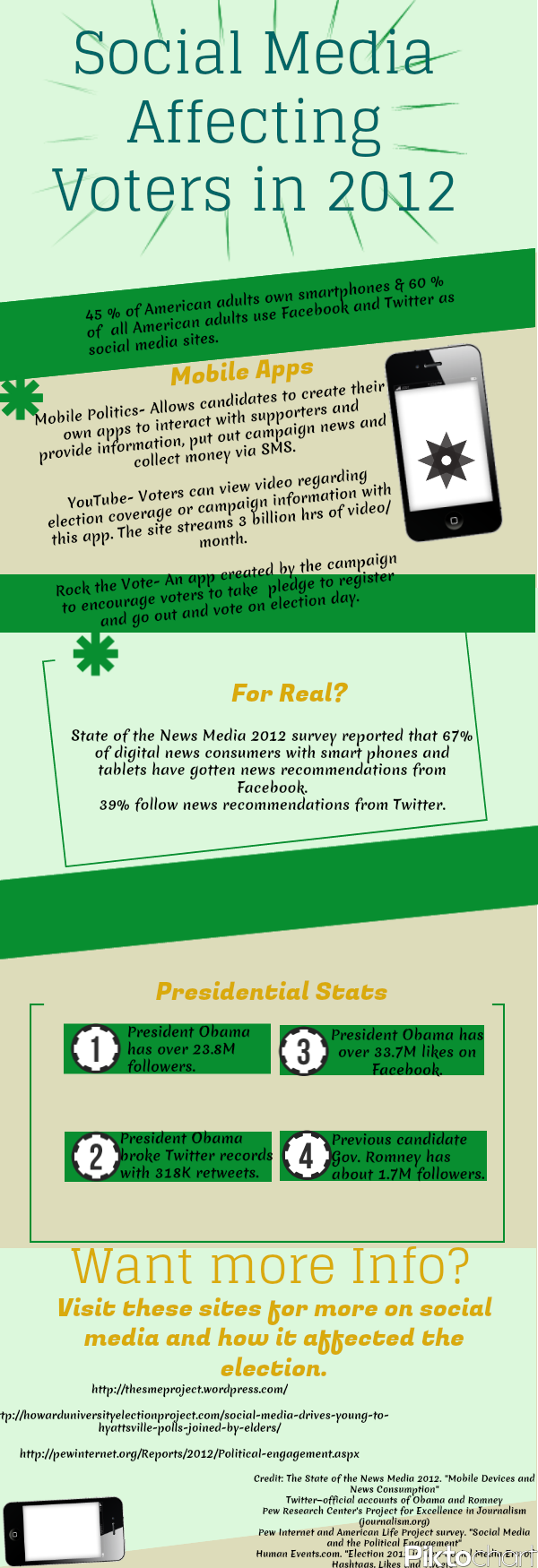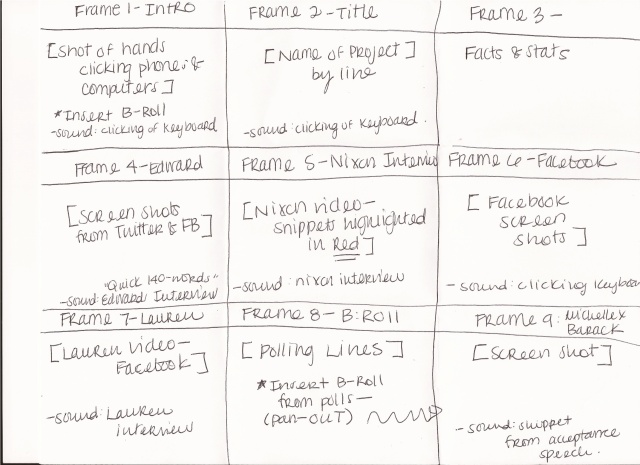By: Kylee Coney
Washington, DC—Titled the “king of social networking” in 2008, President Obama took advantage of four-year-old Facebook and newly-birthed Twitter to gain attention as the new kid on the block. Now, in the 2012 election, both Romney and President Obama competed to satisfy the firestorm of hungry tweeters and Facebook likers with posts and pictures on their campaign strategies, personal lives and ads to attack one another.
Back in 2008, bloggers and journalists alike praised Obama for his intelligence to use social media to his advantage while campaigning against Senator McCain. Four years later, either he or Governor Romney would have been deemed foolish not to use these tools and called out of touch with the current social status of Americans today.
After all 60 percent of all American adults use social media sites Facebook and Twitter—and 39% of all American adults have used them to “post their thoughts about civic and political issues, react to others’ postings, press friends to act on issues and vote, follow candidates, ‘like’ and link to others’ content, and belong to groups formed on social networking sites,“ according to the “Social Media and Political Engagement” survey by the Pew Internet and American Life Project.
“I think in this day of age the president of the United States needs to have a social media presence. People are constantly using it so the person who can show they are most connected definitely I believe adds to their likeability because it shows, hey I’m the president, and I use social media just like you,” said Natelege Whaley, 23, freelance associate writer at AOL.
The rise in social media usage provided a greater outlet for presidential candidates to connect with potential voters in the 2012 election; the growth in popularity and significance of these sites since the 2008 election allowed candidates to reach a larger demographic and gain more supporters, help voters formulate opinions, stay informed or financially give to campaigns.
There has been significant progress since 2008 with the presence of social media concerning politics, election coverage and voter participation.
The platforms themselves have evolved since four years ago, giving candidates the room to step up. According to a recent article by Human Events, Facebook is 10 times larger now than in 2008, while Twitter sees a yearly 30 percent increase and YouTube streams three billion hours of video per month.
“Facebook has added a lot of new capabilities that they didn’t have in 2008. You can see what you’re friends liked; they’ve improved the sharing capabilities,” said Lauren McEwen, Washington Post news aide.
“Now when you like a page, say I like Mitt Romney’s page on Facebook, if that page posts something new I actually see that post. Before, when you like something it had no value. With Twitter, the live blogging capabilities have made it very, very easy to see who’s really causing a stir,” she continued.
The introduction of smartphones and their escalating popularity also play a major role in how social media shape elections in comparison to 2008. Take for instance, the release of the iPhone in mid 2007.
Prior to the election four years ago, people were not able to utilize mobile apps to fundraise, advertise or let alone check Facebook posts or participate in hashtag wars with followers on Twitter during presidential debates between candidates, now they can.
Access to mobile internet circa 2008 was very limited also, or not very user-friendly. Smartphone usage has gone up by 400 percent since then, according to Human Events article.
And with this new easy access to the internet and apps, candidates responded with the way they handled their campaigns in the recent 2012 election run-off.
Enter Mobile Politics, an app and website that lets American candidates network with the public and potential voters. With this app, both Romney and Obama were able to create their own apps to put out campaign news, information and collect money through fundraising from supporters.
Candidates also began accepting donations for their campaigns via SMS for the 2012 election, allowing a personal interaction between voters and presidential-hopefuls like never before thanks to technology.
Not to mention all of the apps created by traditional news sources like CNN’s, “I’m Voting App, along with separate campaign apps created like “Rock the Vote.”
Sites like Facebook and Twitter also now make it possible for candidates to get immediate feedback from the American public, which in a way shaped the way they campaign as opposed to the impact the social media made in 2008.
Now, multiple open platforms for criticism are present that candidates cannot ignore, if they wanted to get elected by “the people” and seem to have an understanding of their interests and concerns.
“You’re getting that immediate reaction from the American public that you weren’t getting before,” said Wendy Wilson, news editor at Essence magazine.
Where in 2008, then-Illinois-senator Barack Obama and his team were proactive with social media use in campaigning against senator John McCain, the 2012 campaign required a different scene and response from candidates to the public.
Governor Romney has roughly 1.7 million twitter followers, while President Barack Obama still is dominating the social media scene with over 23.8 million followers.
During 2012 election season, both candidates took the site to share moments speaking in different states, to respond to political attacks, to share personal family photos and to tweet information about their policies to their respective followers.
“These are the tools that reflect the evolution of campaigning. So if you can reach 100,000 people with a tweet versus paying a couple of million dollars trying to reach those people that’s a good use of your campaign dollars because even though the two campaigns were supposed to succeed a billion dollars this year—trying to reach a nation of 330 million people is just quite a lot,” said Ron Nixon, New York Times correspondent.
“So I think that that’s what these tools have helped the campaigns do—is reach a lot more people in a lot more different ways than they were before,” he continued.
Moreover, the rise of social media and it’s influence on upcoming presidential elections introduce an entirely new demographic to the political scene. The presence of candidates, their policies, advertisements, etc. on social media allows younger people to participate in the discussion and may possible motivate them to vote.
On election day at the Hyattsville Branch Library, 23-year-old project manager Edward Reese said, “Twitter and Facebook are like the main source of news for a lot of people. By using those sources, a lot of people are a lot more informed as far as the younger voters.”
“I can typically log into Twitter and see a quick 140 words of knowledge, and that’s just how a lot of people do it these days,” Reese continued.
But just because social media clearly shaped the recent 2012 election and will have an affect on the future presidential candidates, does that mean it can pre-determine who will sit in the oval office before the election results are actually in?
Campaigns like aforementioned Rock the Vote offer people a way to band together and engage in politics through social media and become involved. This is done by posting and sharing videos, making pledges to register to vote and by actually going out on election day and also by encouraging other people on social networks through viral hashtag efforts and discussions.
Also, people tend to pay attention to and be influenced by their peers. With the astonishing numbers of social media involvement, election talk is hard to avoid and people are persuaded to join in or at least research what is going on.
“I do care a little bit more when I hear a friend in high school say things that I deeply disagree with. And I have to analyze who grew up in the exact same neighborhood as me, who grew up in the exact same schools as me, who had a lot of the same opinions as me growing up—changed her mind, that can sway me more or make me more confident that I’m right. Or I can realize something, I could have an epiphany just based off of what my friend said,” said McEwen.
Just how social media will continue to shape United States elections is unknown, however considering the progress made from 2008 until the most recent 2012 election, its sure to see that the traditional and one-track view of campaigning in order to win the presidency will be reevaluated.




